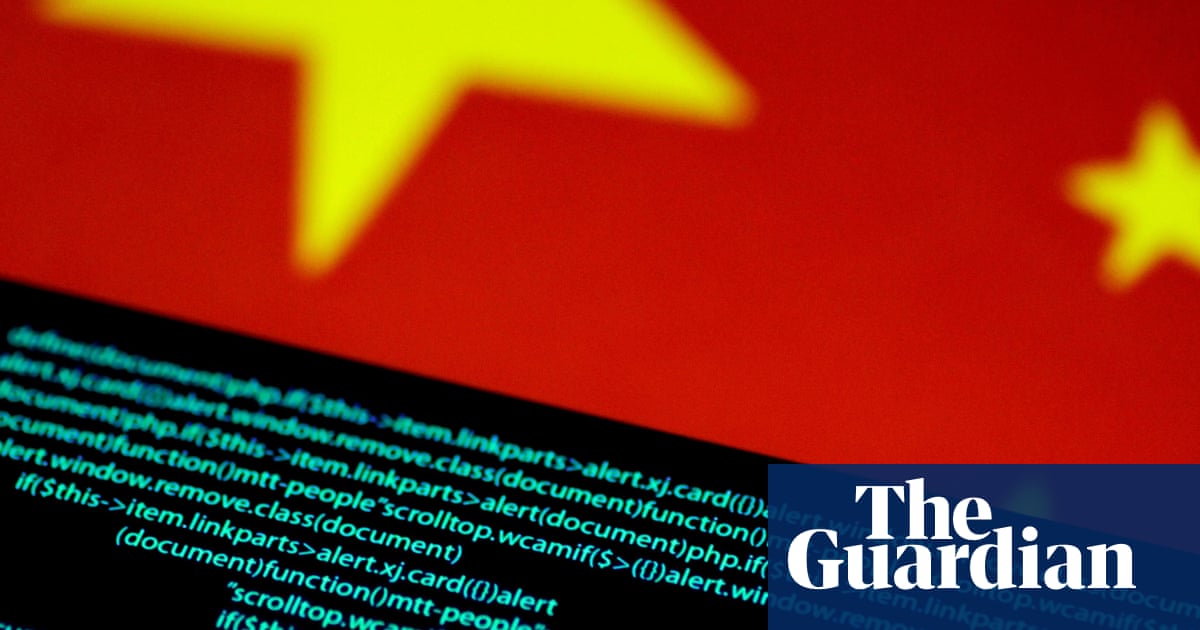The personal details of millions of voters are believed to have been accessed in an attack by China on Britain’s democratic process.
With the UK under pressure to respond, multiple reports suggested that sanctions against individuals thought to be connected with the alleged activity are under strong consideration.
A small group of politicians who are hawkish on China are said to have been called to a briefing by parliament’s director of security, Alison Giles, in relation to the activity.
They include former Conservative leader Sir Iain Duncan Smith, the former minister Tim Loughton, the crossbench peer Lord Alton and the SNP MP Stewart McDonald, the Times reported.
The four are members of the Inter-Parliamentary Alliance on China (Ipac) pressure group, which focuses on issues involving the increasingly assertive Asian power.
At an Ipac meeting on Friday, Luke de Pulford, its executive director, said: “About a year ago the Belgian and French foreign ministries publicly confirmed [Chinese state] sponsored cyber-attacks against our members.
With all the money the UK government pay to large IT companies (IBM, Amazon, Microsoft) and charlatan consultants (IBM, KPMG, E&Y, etc etc) do you think we’ll see a penny of that money back after breaches in the shitty software they’ve implemented? Will we fuck.
I’m sure Rushi has a mate who can fix it for us. … for a price.
From what I can tell it was precisely because the Electoral Commission was not spending money with these kind of folks that they were breached. They were running on old software, poorly configured with minimal spend. They had just failed a security audit.
That might be the case here, fair. However it’s borderline inept that the UK government cannot maintain a dedicated security and audit team for our data. The fact that they have to rely to large consultancy firms that bind the government into inadequate long term contracts is a depressing shame.
If you’re interested check out the history of GDS and why it failed on its initial remit of encouraging more small to medium vendors. I’m not saying that would have helped here, but it highlights the problem of mega large multinational consultancy firms and their stranglehold over providing government services. The amount of money wasted will make your heart bleed.
You might find this interesting https://www.bbc.co.uk/news/technology-66709556
My impression is that the UK has very little “in house” IT skill. A lot of UK digital infrastructure is pretty shoddy because of a longstanding over reliance on external contracting combined with a lack of a decent technical core within the civil service. It feeds into a cycle where fixing things would be too expensive, even though maintaining broken and old stuff is expensive and difficult even without crises like these. It’s a mess.
China! Don’t be so naughty.
We could probably use that as a slogan.
This is the best summary I could come up with:
The UK could impose sanctions on individuals believed to be involved in these acts of state-backed interference, one of which was a separate attack on the Electoral Commission in which Beijing accessed the personal details of about 40 million voters.
With the UK under pressure to respond, multiple reports suggested that sanctions against individuals thought to be connected with the alleged activity are under strong consideration.
They include former Conservative leader Sir Iain Duncan Smith, the former minister Tim Loughton, the crossbench peer Lord Alton and the SNP MP Stewart McDonald, the Times reported.
At an Ipac meeting on Friday, Luke de Pulford, its executive director, said: “About a year ago the Belgian and French foreign ministries publicly confirmed [Chinese state] sponsored cyber-attacks against our members.
The legislation, designed to ensure the UK’s investigatory powers framework remains adequate in the face of evolving threats, includes measures to make it easier for agencies to examine and retain bulk datasets.
If passed, it will update elements of the Investigatory Powers Act 2016 found to require a refresh by a statutory review published by the Home Office in February 2023.
The original article contains 417 words, the summary contains 187 words. Saved 55%. I’m a bot and I’m open source!






